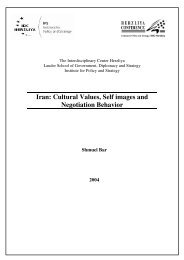Bashar's Syria: The Regime and its Strategic Worldview Shmuel Bar ...
Bashar's Syria: The Regime and its Strategic Worldview Shmuel Bar ...
Bashar's Syria: The Regime and its Strategic Worldview Shmuel Bar ...
Create successful ePaper yourself
Turn your PDF publications into a flip-book with our unique Google optimized e-Paper software.
Bashar’s <strong>Syria</strong> 415Iran <strong>Syria</strong>’s close relations with Iran clearly influenced the <strong>Syria</strong>n assessment. <strong>The</strong> Iranianregime regarded a stabilized oil-rich pro-American Iraq as a clear <strong>and</strong> imminentthreat to <strong>its</strong> own existence. Like <strong>Syria</strong>, it assessed that it would be next on theAmerican agenda if Iraq were to be stabilized. Immediately after the first stage of“Iraqi Freedom,” there ensued a flurry of high-level consultations between <strong>Syria</strong> <strong>and</strong>Iran. Bashar was clearly receptive to the Iranian arguments that <strong>Syria</strong> <strong>and</strong> Iran shouldcooperate to avert the danger. <strong>The</strong> domestic consideration that allowing radical Islamists to act against the Americanpresence in Iraq would shift the focus of local Islamists away from acting againstthe regime. <strong>The</strong> logic of the Hafez al-Asad regime in providing safe haven to terrorist organizationsacting against neighboring countries (PKK <strong>and</strong> ASALA against Turkey, theJapanese Red Army, <strong>and</strong> various Palestinian organizations) <strong>and</strong> allowing them tooperate from <strong>Syria</strong>n soil was adopted by Bashar. According to this logic, such supportserved as a valuable bargaining chip for future negotiations with the challengedcountry.Relations between Damascus <strong>and</strong> Teheran have grown since the Islamic revolution into astrategic relationship. For Iran, the <strong>Syria</strong>n regime is unique in the Arab world, in that itis ruled by Alawites (who are considered by many Iranian Shi’ites to be a sect of Shi’iteIslam). Politically, <strong>Syria</strong> arguably is Iran’s major ally in the Arab world, having supportedIran both politically <strong>and</strong> militarily during the Iraq–Iran War despite the pro-Iraqi solidarityof most of the Arab world. Iran returned the favor by writing off <strong>Syria</strong>n oil debts incurredduring that period. <strong>The</strong> two countries have collaborated intimately on development ofsurface-to-surface missiles (SSMs), <strong>and</strong> Iran’s influence in Lebanon—one of the greatestachievements of the Islamic Republic’s foreign <strong>and</strong> “export of Revolution” policies—is dueto <strong>Syria</strong>n acquiescence <strong>and</strong> support. <strong>The</strong>se relations have held fast despite incidents suchas the <strong>Syria</strong>n suppression of the Muslim Brotherhood rebellion in 1982 <strong>and</strong> unauthorizedIranian activity in Lebanon <strong>and</strong> <strong>Syria</strong>.Iran’s position with the <strong>Syria</strong>n leadership seems to have even strengthened since Basharcame to power, <strong>and</strong> further still since the fall of the Iraqi regime <strong>and</strong> the hostilities betweenIsrael <strong>and</strong> Lebanon in summer 2006. This has manifested <strong>its</strong>elf both directly <strong>and</strong> throughthe relationship between Bashar <strong>and</strong> the leader of Hezbollah, Sheikh Hasan Nassrallah. Oneversion presents <strong>Syria</strong>’s present relationship with Iran as deriving from the same factors thatprompted it to support Iraq: a belief that such a country could serve as a strategic support (“astrategic rear”), admiration for a self-confident <strong>and</strong> proud leadership <strong>and</strong> for leaders who“st<strong>and</strong> up” to the U.S., a sense of “common fate” (fear that if the U.S. succeeds in topplingthat regime, it will surely come after the Ba’th regime in <strong>Syria</strong>). In the Iranian case, this isaugmented by the traditionally close relations between the two countries.<strong>The</strong>se close relations notwithst<strong>and</strong>ing, <strong>Syria</strong> under Hafez al-Asad knew to control Iran’sinvolvement in areas crucial to <strong>Syria</strong>’s strategic interests. Thus, <strong>Syria</strong> reduced the IRGC(Iranian Revolutionary Guard Corps) contingent in Lebanon <strong>and</strong> occasionally put pressureon Hezbollah when the organization’s terrorist activities contradicted <strong>Syria</strong>n interests.Saudi ArabiaIn the Hafez al-Asad era, the <strong>Syria</strong>n relationship with Saudi Arabia was a major supportfor the regime <strong>and</strong> for <strong>Syria</strong>’s regional role. This relationship has been seriously damaged
















